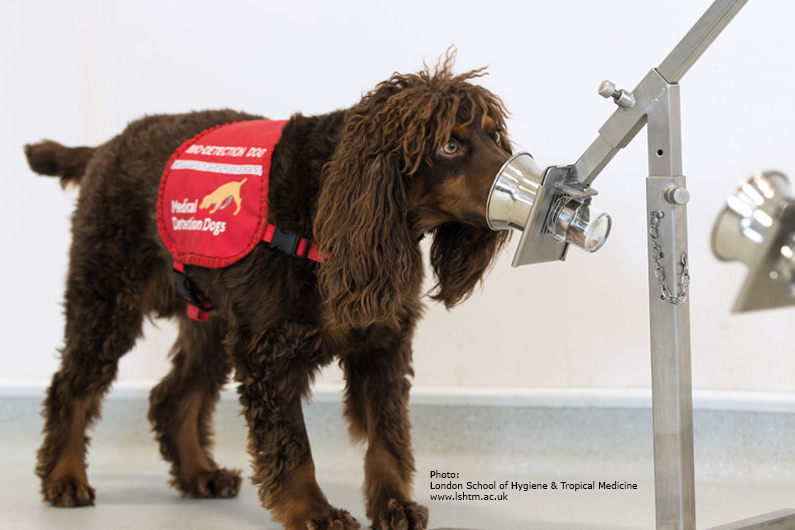Canine COVID-19 detection is being explored for use in traveler safety and other applications, with promising initial results.
Recently published research indicates a new, albeit unusual, method of identifying individuals infected with COVID-19. Researchers at the University of Veterinary Medicine Hanover in Germany recently discovered that with very little training, dogs are able to detect COVID-19 infection solely by sniffing the saliva and mucous of infected patients.
The study published July 23, 2020, by BMC Infectious Diseases included eight dogs that were trained to recognize the presence or absence of COVID-19 infection based on sniffing saliva or mucous specimens. After only one week of training, the dogs were able to identify infected and non-infected individuals with average diagnostic sensitivity of 82.63% and a specificity of 96.35%.
“These preliminary findings indicate that trained detection dogs can identify respiratory secretion samples from hospitalized and clinically diseased SARS-CoV-2 infected individuals by discriminating between samples from SARS-CoV-2 infected patients and negative controls,” the authors of this study concluded. “This data may form the basis for the reliable screening method of SARS-CoV-2 infected people.”
Researchers indicate that this study is preliminary, and there may be the potential for even better detection accuracy with training that lasts for longer than the one week that was used in the initial study.
About Canine Olfactory Detection of Disease Including COVID-19
There is a clear precedent for canine olfactory detection of disease, with previous studies indicating that cancer and malaria produce a scent that dogs can detect. Ongoing research for several years has examined potential testing technologies that can detect the odors that are specific to pathologies.
While there is no potential that COVID-19 laboratory testing volumes will be impacted by canine COVID-19 detection, potential applications are still being explored.
Researchers from the London School of Hygiene and Tropical Medicine (LSHTM), in collaboration with charity Medical Detection Dogs and the UK’s Durham University, are performing trials that could result in modification of traditional airport canine applications to include the detection of COVID-19 in even asymptomatic travelers.
Claire Guest, BSc(Hons), MSc, DHP, HonDSc, CEO and Co-founder of Medical Detection Dogs, said in a statement to CNN that she thinks the dogs’ ability to quickly screen people will be invaluable as the UK eases lockdown measures. “Hopefully this will prevent a second peak and enable precious NHS resources to be used where most needed,” said Guest. “We are incredibly proud that a dog’s nose could once again save many lives.”

Dr. Claire Guest directed one of the first programs in the world to train dogs to identify cancer by odor. She later co-founded Medical Detection Dogs and is now part of a team of researchers with London School of Hygiene and Tropical Medicine that is studying the possibilities of dogs detecting COVID-19. (Photo source: medicaldetectiondogs.org)
Also participating in COVID-19 scent research at LSHTM includes Principal Investigator Prof. James Logan, Prof. Steve Lindsay, Dr. Sarah Dewhirst, Dr. Anna Last, and Dr. David Allen, among others.
The practical barriers of scaling any kind of canine detection in airports is unclear, however, this may be used in larger travel hubs to augment the safety of travelers. The increased demand for potential COVID-19 detection methods may end up contributing to the application of canine scent detection on a larger scale.
The more pertinent consideration for clinical laboratory directors is the possibility that this new research could result in a renewed interest in and funding for technologies that use disease-specific odors to identify the presence or absence of the disease. While it seems very unlikely that such a technology could be developed soon, the COVID-19 pandemic has created a necessity for rapid technological innovation that this new potential application could benefit from.

—By Caleb Williams, Editor, COVID-19 STAT
Related Resources:
London School of Hygiene and Tropical Medicine
Technological Study for Odor Based Disease Identification
DW: German sniffer dogs show promise at detecting coronavirus






